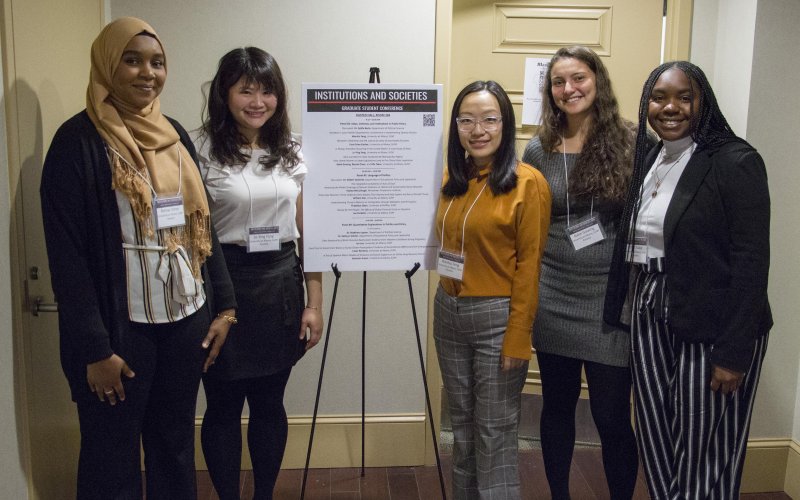Inclusive Institutions and Societies Conference

UAlbany Hosts Seventh Annual Institutions & Societies Graduate Student Conference
On Friday, February 22nd, the Rockefeller College Graduate Association of Political Science (GAPS) and Students of Educational Administration for Change (SEAChange) presented the seventh annual Institutions and Societies Conference in Husted Hall on the University at Albany’s downtown campus. The theme of this year’s event focused on disability politics given the importance for student groups to have at least one equity and inclusion event each academic year.
Dr. Jessica Pidgeon, an alumna of Rockefeller College who received her PhD in political science in 2015, was interviewed by Dr. Patricia Strach, Director of Research and Policy at the Rockefeller Institute of Government and professor in the Political Science and Public Administration and Policy Departments at Rockefeller College, served as the facilitator of the keynote event, PrAcademics: Turning Academic Practice into Non-Academic Success.
Dr. Pidgeon, who currently works for the New York State Development Disabilities Planning Council, discussed how her education at UAlbany helped her learn vital skills that she could take into the workplace with her job in New York State government. Dr. Strach and Dr. Pidgeon talked about the importance of finding practical applications for academic skills in the workplace. Dr. Strach also interviewed Dr. Pidgeon about her dissertation research on disabled individuals and political participation and addressed some of the challenges and opportunities of her research.
“For the past seven years, this conference has served as an important event not only for sharing research with graduate students in and outside of our respective departments, but also for preparing for major national and regional conferences in our respective disciplines,” said Rockefeller doctoral student Keith Preble, who chaired the organizing committee.
This sentiment was echoed by GAPS vice-chair Shikshya Adhikari, who remarked, “Having a friendly and relaxed venue for discussing one’s research can help graduate students practice their presentation skills while getting feedback from a faculty discussant here at UAlbany
Over 100 students, faculty, and staff attended the conference along with individuals from around the community attending the day’s panels and events. Thirty-three students presented their work during the day’s nine panel sessions, which ranged from ideas, interests, and institutions in public policy to politics and policy issues in Southeast Asia. In addition to graduate student panels, Dr. Pidgeon chaired a panel on disability politics with undergraduate panelists from her fall semester seminar.
While most attendees were graduate and undergraduates from UAlbany, a number of participants came from colleges and universities around New York State and further afield, such as University at Buffalo, Rensselaer Polytechnic Institute, and the University of North Carolina at Chapel Hill.
"The planning committee worked long and hard to pull this conference together,” said Polina Denisova, vice-chair of the organizing committee. “We made a purposeful effort to contact different departments and disciplines here at UAlbany and at other institutions in the region and nationally to make this event a success. I talked to people who traveled for hours to present at the conference -- and I am happy we made a choice to reach out."
The annual conference is open to all graduate students in nearby colleges who are engaged in a wide range of research areas, including anthropology, area/regional studies, criminal justice, economics, education, environmental studies, history, informatics, law, nano-economics, philosophy, political science, psychology, public administration & policy, organizational studies, sociology, social welfare, and urban planning.
“The conference gives the students an opportunity to present their own works to the audiences and practice their public speaking skills,” said Zheng Wang, vice-chair of the conference. “It’s also very important to network with people from other disciplines, which can provide the students with different perspectives on their research.”


